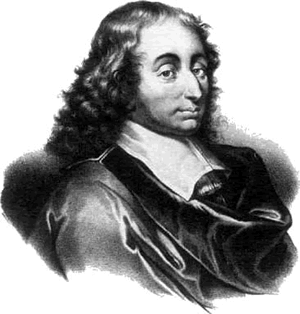Blaise Pascal

|
principal papers hardware software keywords pensees, pascaline see also related subjects |
Achievement
Invented one of the first mechanical calculators: the pascaline
Biography Before Pascal turned 13 he had proven the 32-nd proposition of Euclid and discovered an error in Rene Descartes geometry. At 16, Pascal began preparing to write a study of the entire field of mathematics, but his father required his time to hand total long columns of numbers. Pascal began designing a calculating machine, which he finally perfected when he was thirty, the pascaline, a beautiful handcrafted box about fourteen by five by three inches. The first accurate mechanical calculator was born. The pascalene was not a commercial success in Pascal's lifetime; it could do the work of six accountants and people feared it would create unemployment. Pascal was dismayed and disgusted by society's reactions to his machine and completely renounced his interest in science an mathematics, devoting the rest of his life to God. He is best known for his collection of spiritual essays, Les Pensées. Even though the basic design of the Pascaline lived on in mechanical calculators for over three hundred years. As a counting machine, the Pascaline was not superseded until the invention of the electronic calculating machine. "The arithmetical machine produces effects which approach nearer to thought than all the actions of animals", wrote Pascal in Pensées, (a -customarely- lengthy piece) "but it does nothing which would enable us to attribute will to it, as to animals." Pascal, genius by any measure, died of a brain hemorrhage at the age of 39. In 1968 a programming language (PASCAL) was named after him. Chronology
Honors and awards |
![]()
| Last Updated on May 15, 2003 | For suggestions please mail the editors |
Footnotes & References
| 1 | |
| 2 | |
| 3 |